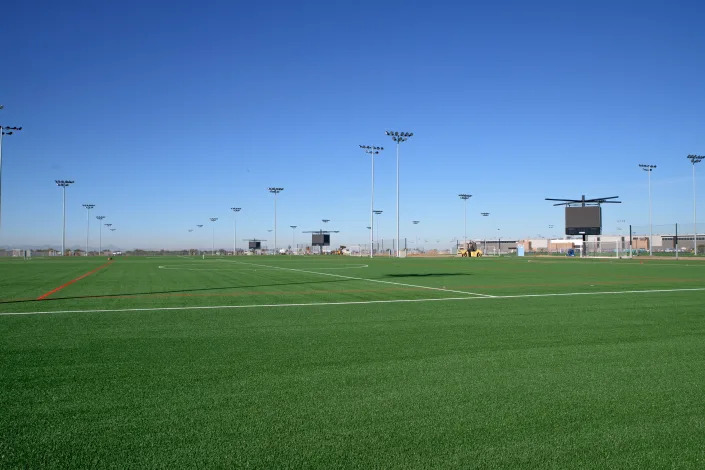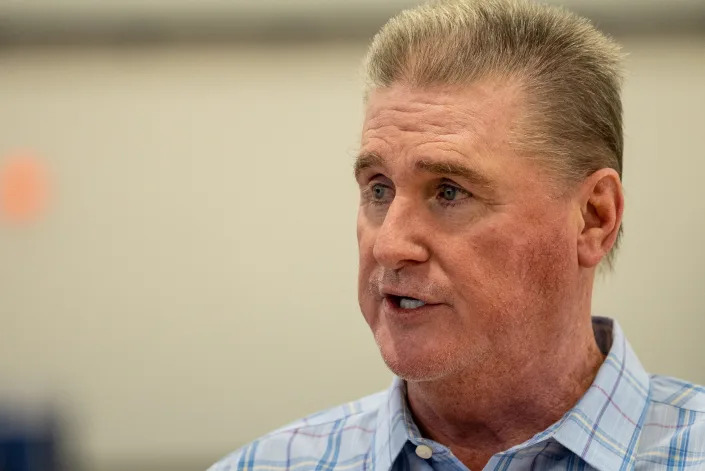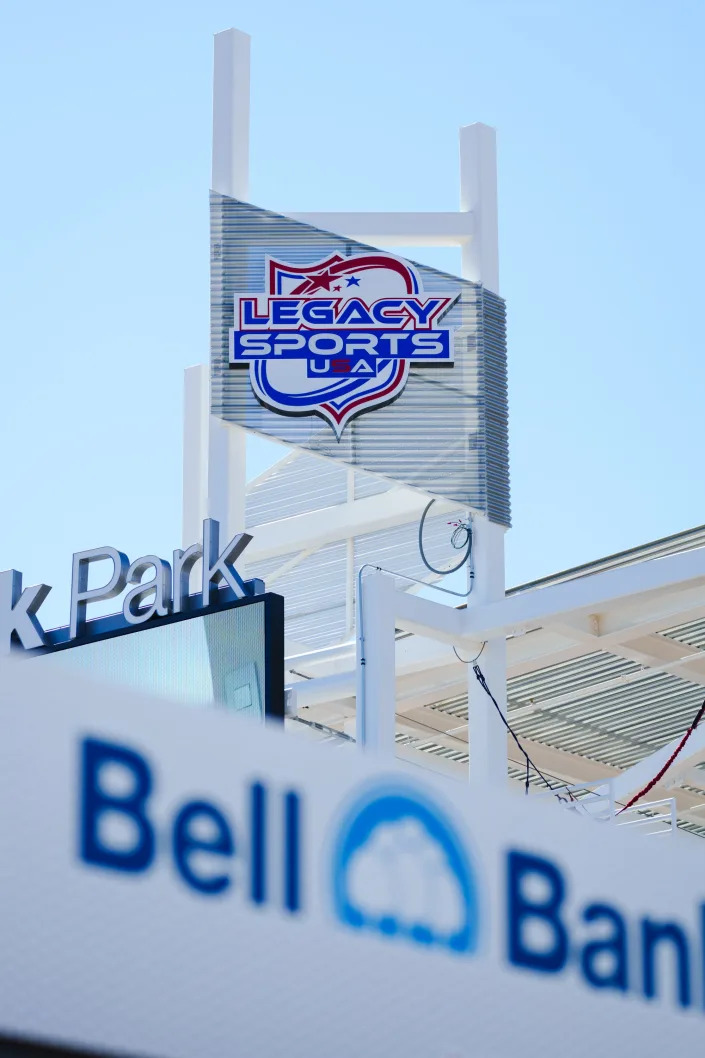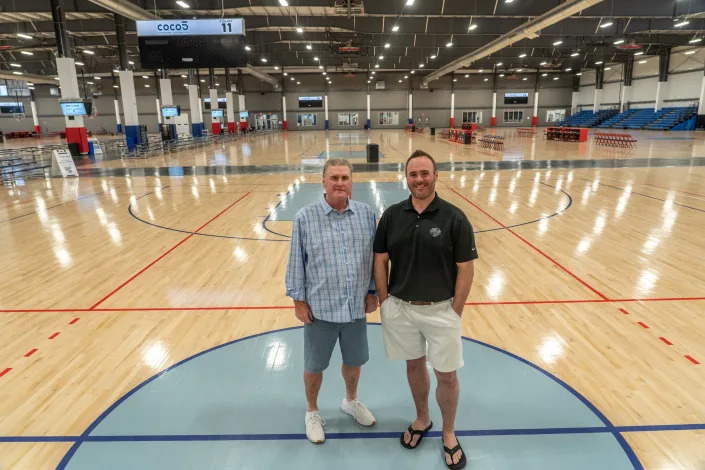Legacy Park has drawn hordes of athletes and their families to the multiple soccer fields, baseball fields, basketball courts and pickleball courts sprawled across its 320 acres. It has remained open during the bankruptcy proceeding, with the judge authorizing temporary funding to keep it running.
The facility, according to testimony in bankruptcy proceedings, has been losing $1 million a month, despite the heavy traffic it has drawn to its previously empty corner of east Mesa.
Legacy Park was the brainchild of Randy Miller, who tried in vain for decades to raise private funding for a facility he envisioned housing all manner of athletic events simultaneously. Miller was finally able to build Legacy Park thanks to a relatively obscure state agency: The Arizona Industrial Development Authority.
That arm of the state government helped provide tax-exempt funding for the project, issuing more than $280 million in bonds in August 2020.
Miller created a non-profit entity called Legacy Cares in
- One example cited by the motion: A company owned by the head of Legacy Cares, Doug Moss, was set to receive a potentially lucrative “technology advisory fee.” But bondholders were told the company, KingDog, was independent, the motion says. Moss’s ownership was not disclosed in the prospectus.
- The motion also outlines more than $7 million in loans from Legacy Cares to Legacy Sports and other entities owned by Miller, including two that looked to build similar facilities in Texas and Tennessee.
- The motion suggests the money from those loans came from bond proceeds, which the motion says would be an improper use.
- And, just before it filed for bankruptcy, Legacy Cares decided to terminate Randy Miller’s company, Legacy Sports, as the operator of the park.
- But the company it chose to reverse direction was, according to the motion, not a “wholly new entity,” but one owned by Randy Miller’s son, Brett Miller. That newly-created company, Elite Sports Group, had not yet filed the proper paperwork to transact business in Arizona, the motion said.
-----------------------------------------------------------------------------------------------------------
That fact was never disclosed to creditors, the motion said, but was only revealed through informal emails between the U.S. Trustee’s office and attorneys for Legacy Cares.
A spokesman for Legacy Cares did not make Moss or anyone associated with the non-profit available for an interview. But, in a statement, Legacy Cares called the motion “reckless and unnecessary.”
It said the motion was largely based on a telephonic court hearing during which Moss was peppered with “a series of random questions,” mostly about documents he didn’t have immediate access to and that he didn’t prepare.
The Legacy Cares statement said that it was working to sell the facility for the highest price possible, a plan it said was supported by the trustee of the bonds, the landlord of the park and a committee of contractors who claim they were also owed money.
The trustee’s motion, Legacy Cares said in its statement, “will only hinder that process.”
- The judge in the case scheduled a hearing on the motion on July 27.
Looking for a true fiduciary
The attorney for the U.S. Trustee asked the judge to appoint someone to serve as “true fiduciary to all creditors to preserve, protect, and pursue all assets of the estate.” That person would also be called a trustee, but tasked with guarding the interests of Legacy Park, not the public.
The motion said that such a bankruptcy trustee, if appointed, could also “pursue causes of action against Legacy Sports and any insiders” and ensure assets are preserved for the estate and creditors.
Alternatively, the motion asked that the judge dismiss the bankruptcy case altogether, citing the “gross mismanagement” of the facility it detailed in its motion.
East Mesa: Development near Phoenix-Mesa Gateway Airport could bring restaurants, hotels
It is not clear what would happen to Legacy Park should the bankruptcy case be dismissed and the protection granted by the court evaporate.
Several contractors have filed liens against the property for unpaid labor. Those liens ask the court to order the sheriff’s office to seize the property and auction it off so the bills could be paid.
Bondholders could foreclose on the property, seizing it as an asset and looking to recoup their investment somehow. Schedules filed with the bankruptcy court show bondholders are owed in the neighborhood of $300 million.
- Estimates of the value of the park have ranged between $50 million and $185 million.
Moss testified the facility was worth at least $50 million during a June bankruptcy hearing.
An attorney for Legacy Cares mentioned the $185 million price during a May hearing, saying that the company handling offers for the sports park will receive a bonus if the price is above that amount.
Trouble at Legacy Park started surfacing months after it opened.
- In a call with investors in June 2022, Chad Miller, who ran Legacy Sports along with his father, Randy Miller, promised bright days were around the corner, blaming financial woes on the COVID-19 pandemic and supply chain issues.
- In October, Legacy Cares defaulted on its bond payments. A group of bondholders met to try to salvage a deal, but instead walked away.
The company that was looking to restructure the deal, Loop Capital, was retained by Legacy Sports, Miller’s company.
During a telephonic hearing in June, Jennifer Giaimo, the attorney for the U.S. Trustee, asked Moss why Legacy Sports brought in that company and not the owner, Legacy Cares.
Giaimo asked Moss if he authorized Legacy Sports to do so. Moss, according to a transcript filed with the motion, said he did not. Rather, Legacy Sports “took it upon themselves” to contact Loop Capital.
- The motion said that answer showed that Moss “tacitly allowed Randy Miller” to pursue refinancing for Legacy Cares “even though Miller was not an officer, director, or employee of (Legacy Cares).”
In another portion of the transcript, Giaimo asked Moss about loans made to Legacy Sports and other entities operated by Randy Miller.
- Moss said that the non-profit’s financial officer would be best equipped to answer the question and, according to the transcript, he seemed to fumble for an answer.
“I believe the bond documents prohibit us from doing loans so I won't…” he said, according to the transcript. “This is where I’m out of my lane here.”
This article originally appeared on Arizona Republic: Court filing details money troubles at Legacy Park; asks for overseer







No comments:
Post a Comment